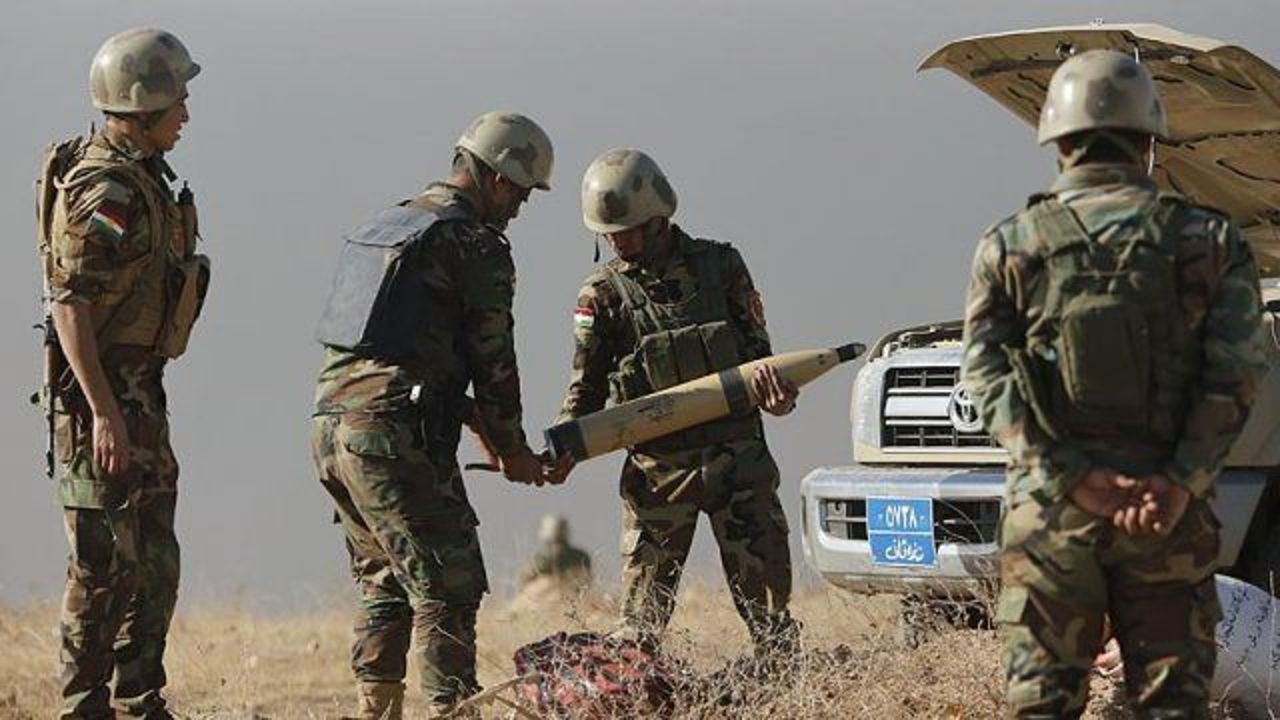Battle to oust Daesh from Iraq’s Mosul gathers pace
The battle to free Iraq’s second-largest city gathered pace Monday as Kurdish Peshmerga forces and the Iraqi army pounded Daesh positions from the east and south of Mosul.

By Monday afternoon, Peshmerga forces were 7 kilometers (4 miles) east of the city while the army had started penetrating the Al-Kuwer area to the southeast, military sources told Anadolu Agency.
The latest developments came within the context of a broad Iraqi army operation -- launched early Monday -- to clear the beleaguered city of the Daesh terrorist group.
Peshmerga forces, which are deployed along the Al-Kazir axis east of Mosul, began their advance at dawn, capturing eight villages on the city’s outskirts, according to Maj. Mustafa Sarhank.
“The advance is continuing; we are now near the intersection of the Al-Hamdaniya district some 7 km east of Mosul,” he told Anadolu Agency.
The captured villages are located along the road linking Mosul to Erbil, the capital of northern Iraq’s autonomous Kurdish region, Sarhank said. Daesh militants had torched several oil wells in Al-Hamdaniya as they retreated, he added.
The U.S.-led anti-Daesh air coalition had continued to strike Daesh positions along the Al-Khazir line.
Meanwhile, the army’s 9th Armored Division penetrated Al-Kuwer from two areas and were facing resistance from Daesh, Lt. Yassin al-Nuaimi said.
The operation to retake Al-Kuwer would take “some time”, Nuaimi added due to mined and booby-trapped roads, buildings and other sites in the area. Daesh had also deployed snipers in strategic areas on the city’s outskirts.
- No coalition warplanes
Nuaimi also pointed out that, as of 1 p.m. local time (1000GMT), coalition warplanes had not participated in the operation to capture Al-Kuwer.
In some of the first reports of casualties, five Peshmerga fighters were killed by a suicide car-bomb -- and ten others injured -- to the east of Mosul, according to a Peshmerga officer.
The officer, who spoke to Anadolu Agency anonymously due to restrictions on talking to the media, said the son of the Kurdish Regional Government’s vice president had been among the injured.
Meanwhile, four Iraqi soldiers were killed while fighting Daesh south of Mosul, according to an Iraqi military source, who said advancing troops were encountering fierce resistance.
A senior U.S. general on Monday said the battle “will likely continue for weeks, possibly longer”.
“We can’t predict how long it will take for the Iraqi security forces to defeat Daesh in Mosul but we know they will succeed, just as they did in Bayji, in Ramadi, in Fallujah and, more recently, in Qayyarah and Sharqat,” Lt. Gen. Stephen Townsend, commander of the U.S.-led coalition, said in a pre-recorded video message.
The coalition is supporting Iraqi forces with air support, artillery, intelligence, advisers and forward air controllers, according to Townsend. “This may prove to be a long and tough battle but the Iraqis have prepared for it and we will stand by them,” he said.
The offensive is likely to be complicated by Daesh’s use of “deeply unethical and dangerous tactics to try to hold on to that city,” the White House said.
“This is an important operation but one that we anticipate is going to take some time given how significant the city is both strategically and symbolically, how large the city is and how long ISIL has had to dig in and fortify their defenses in that city,” spokesman Josh Earnest said, using an alternative acronym for Daesh.
He stressed that the U.S. was mindful of ensuring that the operation is “consistent with the need to look out for basic universal human rights and to ensure that these operations are not being used as a cover to carry out retribution against other religious groups”.
- Sectarian tension
Sectarian strife between Mosul’s largely Sunni Muslim population and Shia Muslim militias, who have been accused of carrying out atrocities against Sunnis in other parts of Iraq, is a major concern for those taking part in the operation.
On Monday, Peshmerga fighters prevented pro-government forces from joining the frontline at Bashiqa, northeast of Mosul, because they were brandishing Shia banners. An Anadolu Agency reporter at the scene said they were only allowed to continue after taking down the flags.
The much-anticipated army operation to "liberate" Mosul from Daesh, which overran the northern city in June 2014, was announced by Prime Minister Haider al-Abadi early Monday morning.
In a statement, the Kurdish Regional Government’s Peshmerga Ministry announced that at roughly 6.00 a.m. local time (0300GMT) a “large-scale, coordinated operation was launched by Peshmerga forces in Al-Khazir east of Mosul while Iraqi security forces mobilized from Al-Kuwer and Al-Qayyarah south of Mosul”.
The twin moves, the statement added, constituted “a first step toward clearing Nineveh province of Daesh terrorists”. Mosul is the capital of Nineveh.
Along with army and federal police personnel, Peshmerga forces, the Hashd al-Shaabi pro-government Shia militia, the mainly Sunni Hashd al-Watani militia and the international coalition are taking part in the campaign.
Recent months have seen the army, backed by local allies on the ground and coalition air power, retake much territory. Nevertheless, the terrorist group remains in control of several parts of the country, including Mosul.
The army and its allies have staged a gradual advance on the city, which officials in Baghdad have vowed to free by the end of the year.
An international summit on the operation will be held in Paris on Oct. 25, the French Defense Ministry said.
Following the launch of the operation, Turkish Airlines said flights to Najaf, Sulaymaniyah and Basra in Iraq had been suspended.
Anadolu Agency







